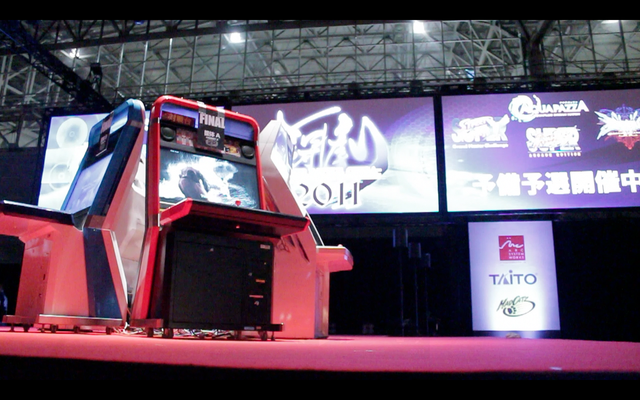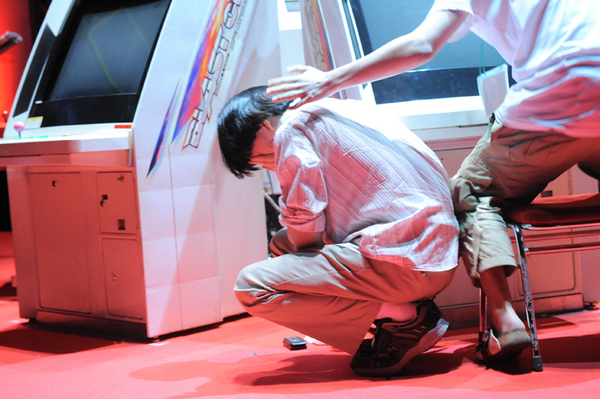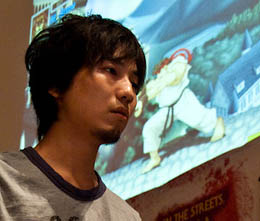This post has not been edited by the GamesBeat staff. Opinions by GamesBeat community writers do not necessarily reflect those of the staff.

Another year of Tougeki Super Battle Opera is in the books. That means another year of U.S. teams failing to make it out of their first round brackets and another year of players (From around the globe) loathing the single elimination format. I, for one, can't say I blame them. If Tougeki hopes to keep up with the forward thinking (and rapidly growing) American tournament scene, then some changes must be made. Specifically single elimination and the single game team format.
 Yes, one can argue that the dramatics of Japan’s premiere fighting game tournament trump any tournament on Earth: the pageantry, the showmanship, the agonizing defeats. Being there in person, I must admit that the showmanship of the Japanese is second to none. But, underneath all of that, there is some substance that goes untapped, leaving competitors and viewers alike asking the same old question: "What if…".
Yes, one can argue that the dramatics of Japan’s premiere fighting game tournament trump any tournament on Earth: the pageantry, the showmanship, the agonizing defeats. Being there in person, I must admit that the showmanship of the Japanese is second to none. But, underneath all of that, there is some substance that goes untapped, leaving competitors and viewers alike asking the same old question: "What if…".
Now, before you start calling sour grapes on the American, please hear me out. There are a lot of wonderful aspects that the SBO/single elimination format brings to the table. The only problem is that they only benefit the fluidity in which the tournament is ran; not the competitors themselves, necessarily. Don't get me wrong, the tournament is ran to a "T". SBO is specifically set up to be ran in one day and one day only. It is like a well oiled machine that does one job and one job only: pump out one winner at the end of one day. And SBO does it's job well…a little too well.
Months leading up to Tougeki, precincts from around the globe hold single elimination tournaments to decide who will represent their region in Super Battle Opera. You can only qualify for Super Battle Opera if you are crowned champion of a regional Super Battle Opera qualifier. The exception is a "play-in" tournament that takes place in the hours leading up to Super Battle Opera, in order to decide the final roster slot (Think the "play in game" NCAA basketball has for March Madness).
Essentially, what these qualifying tournaments do is whittle thousands of competitors down to 32 players or teams (some games are individual and some are team based). Logistically, those numbers make organizing and running a tournament far more simple too prepare for. Instead of running through thousands of competitors over the course of 2-3 days, the work is done over a multitude of weeks, leaving you with only the top 32 to deal with, come SBO.
The 32 players/teams are broken up into four brackets consisting of eight players/teams per bracket. The four brackets then play through, one at a time, until the overall tournament is left with a "final four" that consists of the champions from brackets one, two, three and four. Then, there is a break where announcements, presentations, or interviews are given to entertain the crowd, while the tournament organizes it's next 32 competitors for the next game. Once all the games have decided their "Final Four's", then the "Finals" begin.
In total, the tournaments take roughly eight to nine hours (Including interviews, announcements, presentations, etc) to complete. For tournament organizers, eight to nine hours is an absolute dream come true! If you look at the EVO (Evolution) series in America, the logistics of prepping a hall for a 1,000-2,000 man double elimination tournament is anything but short of a nightmare. You have a hall bursting at the seams with stations consisting of monitors, game systems, games, judges, brackets…the list goes on and on. Whereas SBO consists of a single stage holding two machines for each game (only the Finals are played on the stage), and then four stations (two to the left and two to the right of the stage) consisting of head-to-head cabinets where the brackets of 32 will be played…AND its single elimination. Thats it. One main stage and then four stations on either side of the main stage where all the action takes place.
Organization, small numbers, simplicity, and single elimination are obviously the driving force of SBO.
To be able to run tournaments for four different games and cram in exclusive interviews, unreleased game presentations, and the likes all in one day, what more could a tournament organizer ask for? Probably nothing.
What more could the players and fans ask for? Getting the single elimination format the hell out of there and adopting the American double elimination, two out of three, and character change format.
Here are the negative aspects of SBO: single elimination, no character changes, and single game format. The complete opposite of the rest of the world.
In a game based on reading your opponent's tendencies, play style, and weaknesses, having three rounds (at the most) to dissect your opponent and formulate a game plan is impossible. That's right–impossible. In order to understand opponent's tendencies, what do players need more than anything else? Data. How is data obtained? Through experimentation/trial and error (also known as "playing matches" )
Example A:
I just got knocked down. Let me do a wakeup uppercut and see what my opponent does.
It hits.
I know he is suspect to wakeup “shoryu’s”.
Example B:
I get knocked down, again. Let me do a wakeup uppercut and see what my opponent does, this time.
He blocks.
I know that he is weary of my wakeup “shoryu”.
Example C:
Does he anti-air my jump in attacks?
Yes.
I know now that he is looking for jump ins and I must devise a plan for a jump in setup.
Granted, you can obtain this information in a single elimination format, but by the time this information is gathered it doesn't matter! Because the match is almost over (if not already…)!
Even if SBO were to adopt a “two out of three, single elimination” format instead of the “two out of three, double elimination” format that is used in America, that would be eons better than their current format of “one game, single elimination.”
It isn’t uncommon for top players to “throw” a game or at the very least “throw” a round to gain a better understanding of the tendencies, reactions, and play style of their opponents.
Say Player A defeats Player B in a one game, single elimination round of SBO. Player A moves on and Player B goes home. Player A is not necessarily the better player. “But…Player A beat Player B…” True! But, who is to say that Player B wouldn’t win the next two out of three games against Player A? Or even the next nine out of ten games? It is literally impossible to determine who is the better player after one game and one game only.
A single game format is not a legitimate way to determine the better player, even on that day. There is no statistical analysis that could be done, no amount of data gathered, that could remotely determine that Player A is truly better than Player B in a single game. You look at every other game, every other competition, every other sport and there are multiple games, rounds, holes, and sets that determine who wins and who loses.
In the NBA playoffs, winners are determined in best of five and seven game series, not by winning a single game. In boxing, if a fighter wins the first two rounds on points, does that make them the better fighter? No. They fight 12 rounds to determine the winner, unless a KO or TKO occurs. In tennis, the first person to win the best of three or five sets is declared the winner. Each set is made up of six games! That’s right, six!
And, even in baseball, a game is not official unless a minimum of FIVE innings are played (4 1/2 if the home team is ahead), in the event of a rainout/catastrophe. Over the course of a single game, teams will bat through their order three times (at the very least, considering nobody gets on base):
9 innings x 3 outs an inning = 27 outs. Yes, I show my work.
So, if we go by the league minimum of five innings, that means at the very least 15 players must bat in order for the game to be official.
5 innings at 3 outs an inning = 15 batters minimum (assuming that nobody gets on base).
There are 9 players in a lineup, meaning that over the course of five innings where a minimum of 15 at-bats must take place…
15 ÷ 9 = 1.6 times through the lineup. In percentage…160% This is almost twice through.
What the work just determined, if it wasn’t clear enough, is that teams must bat through their lineup a minimum of 1.6 times a game (again, assuming nobody gets on base) in order for the game to be considered official. 1.6 is more than 1. If you round up 1.6 you would get 2. If you took the numbers that I just produced in a game of baseball and applied them to SBO…
SBO:
1 play-through determines a winner
MLB game:
Minimum 1.6 times through a lineup to determine an official game
…you would see that baseball games need almost twice the amount of data to determine a winner of a game than that of a round at SBO. Essentially, teams almost have to bat through their lineups twice in order to determine the better team. Teams don’t bat through their lineups once, have a rainout then call it a day; more data must be collected to see who is the better team.
The point is this: In determining the best team/player there must be sufficient proof that player/team A is truly better than player/team B. The proof is in the data! Data = games played! One batch of data is not proof enough to say “This person is better than the other person; they should move on.” I believe, you need a minimum of two out of three games (minimum) in a single elimination format.
The inability to get a good read on your opponent is only one of the gripes players have with SBO. Players inability to change characters is also a controversial one. One bad match-up, one bad draw, you can kiss your tournament hopes goodbye.
After Ryan “Filipino Champ” Ramirez and Mike Ross lost their opening round match, we took a walk around the hall with the other American players and ran into Itabashi “Zangief” (Arguably the best Zangief player in the world). He greeted us with a weak smile and a wave as he approached us.
“Itabashi! How did you do in the tournament?” asked Ryan.
The look on Itabashi’s face said it all. His smile faded, lips pursed, Itabashi looked out to the main stage and shook his head.
“Bad matchup. One game, too.”
We all nodded. Ryan asked, “Two out of three better? Like in America? Much better, huh?”
Itabashi’s eyes got as wide as saucers and his eyebrows almost disappeared underneath his hair as he nodded his head with an emphatic “YES.”
That said it all. Itabashi didn’t need to say another word. The look on his face and the tone in his voice confirmed, once and for all, that players are done with this single game, single elimination format. Itabashi isn’t the first Japanese player to voice his dislike for the SBO format, either.

Daigo Umehara, the poster child for fighting game enthusiasts around the world, has also voiced his dislike for the SBO format. In fact, he has encouraged players to venture out to America to attend the more forgiving Evolution formatted tournaments. Two out of three games, double elimination–that means more games, more data, an accurate evaluation of who is the better player.
What we have here is a possible change of influence in the fighting game community from East to West. Where Japan was once the premier place for tournament play, with their unforgiving, “barbaric” (I use the term loosely), cutthroat style of tournaments; it seems the SBO format has grown stale on the rest of the world. More forward thinking tournaments, like Evolution in America, give the players, fans, and even the organizers what they want: a more accurate barometer to decide the best players in the world.
With the large influx of foreign competitors, over 2 million unique stream viewers, and roughly 5,000+ attendee’s, Evolution’s numbers speak for themselves. Lets not forget that Evolution is a tournament that is still growing. If SBO wishes to stay relevant, some changes need to take place, and they need to take place soon.
But, don’t take my word for it. The players and the numbers speak for themselves.
